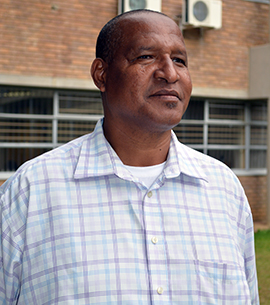Latest News Archive
Please select Category, Year, and then Month to display items
09 November 2018
|
Story Charlene Stanley
|
Photo Charlene Stanley
 Dr Tseliso Ntili, HOD of the Free State Department of Water and Sanitation, warns that pollution caused by mismanagement of municipal water-treatment works puts severe pressure on the province’s water security.
Dr Tseliso Ntili, HOD of the Free State Department of Water and Sanitation, warns that pollution caused by mismanagement of municipal water-treatment works puts severe pressure on the province’s water security.
“Despite our water challenges, Bloemfontein will never become a second Cape Town.” This firm assurance was given by Dr Tseliso Ntili, HOD of the Free State Department of Water and Sanitation, during his presentation at the recent regional seminar of the Faculty of Law’s Environmental Law Association.
The theme of the seminar was Water Quality and Water Security in Bloemfontein and was attended by staff and students from the Faculty of Law and the Faculty of Natural and Agricultural Sciences, as well as relevant role players from private, business, and government sectors.
Not enough water for city’s needs
Water restrictions in some form do seem to remain part of our future landscape though, as Dr Ntsili explained that the city’s current water yield of 218 megalitres per day still fell short of the demand of 259 megalitres per day.
Pollution and mismanagement at municipal level
He pointed out that a big cause for concern was that 75% of the Free State’s waste-water treatment works were dysfunctional. Housekeeping and security at these plants are often severely neglected. Yet, it is difficult for the Department of Water and Sanitation to act against offending municipalities.
“In intra-governmental disputes, the courts must be satisfied that organs of state have taken all reasonable steps to settle contentions – which can be a time-consuming process,” he explained.
Dr Ntsili said that the Caledon River System’s dwindling water levels due to low rainfall and siltation was also a concern, but that plans were underway to supplement the water supply to Bloemfontein via the Gariep Dam by 2026.
However, he warned that poor water management could drastically affect these long-term plans.
“If we can’t manage pollution, the cost will be high. Water security will be challenged, and we will have water shortages – not because of drought, but because of negligence.”
Prof Dejene’s inaugural lecture to focus on light energy
2016-05-05

Prof Francis Dejene
Photo: Thabo Kessah |
The Dean of the Faculty of Natural and Agricultural Sciences, Prof Danie Vermeulen, and the Assistant Dean, Dr Tom Ashafa, will be hosting the inaugural lecture of Prof Francis B Dejene on Friday 6 May 2016 at 17:00 in the New Science Building Auditorium on the Qwaqwa Campus.
Prof Dejene, a Professor of Physics in the areas of solar energy and phosphor, is a National Research Foundation C3-rated researcher with more than 100 articles in international peer-reviewed journals as well as more than 1 000 citations in author references. He has also made more than 100 national and international conference contributions. Prof Dejene has also acted as a reviewer of about 15 international and national professional journals and has supervised more than 25 MSc and PhD students.
The subject of the lecture will be ‘Light energy in service of mankind – from nanoscale to microscale’.